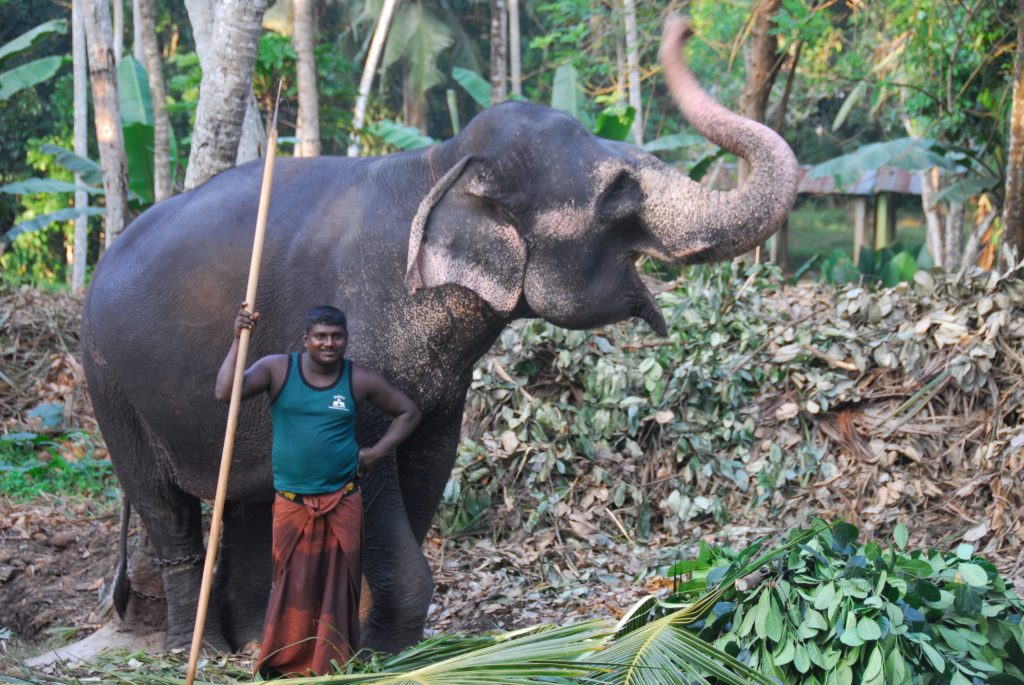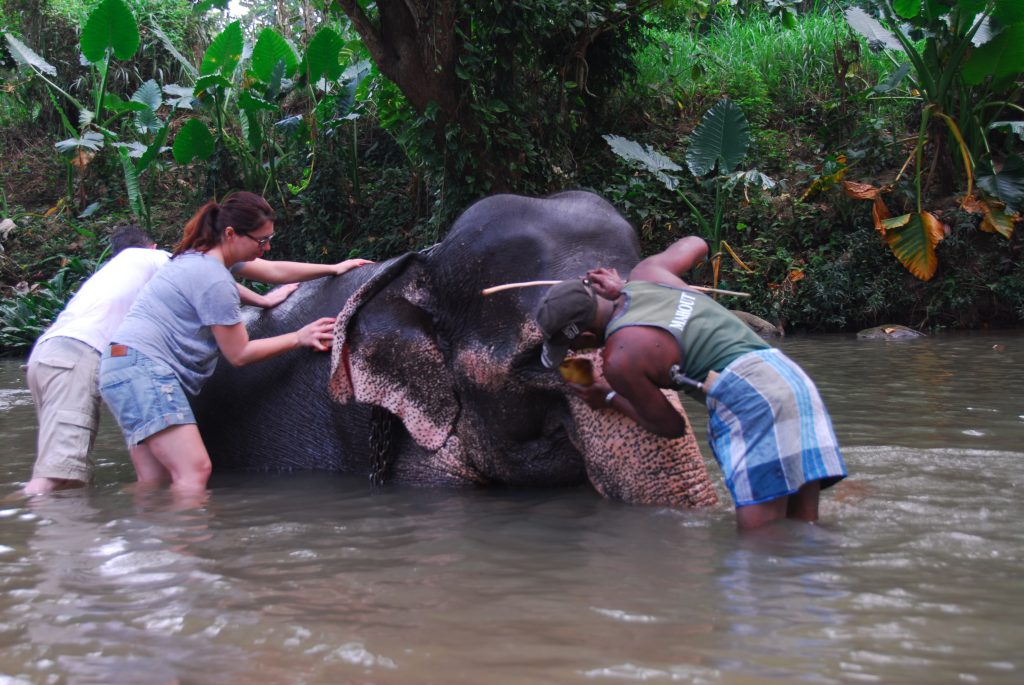’So do you like it here?’ asked the English tourist, while I was on duty at the fruit shop.
’Have you ever wondered about the meaning of life?’ I asked instead of an answer, slicing up a rotund pumpkin and scattering seeds all over the counter.
’Yeah,’ he probed.
’Well, I found it,’ I said and laughed. ’In a pile of elephant poo!’
He laughed and thanked me for the insight. He might go do some volunteering in Thailand too, he said. I told him not to waste precious time and get on it.
I had been at the Millennium Elephant Foundation for a week and I wasn’t lying when I said I had found the meaning of life in a pile of elephant poo. The meaning of life was waiting for me and my fellow volunteers every day in the elephant night beds, which we proceeded to clean in the relentless tropical sun every weekday, straight after breakfast. Our day started at 7am, with instant coffee (Nescafe 3-in-1 from across the road) and tepid water from the kettle that never quite reached boiling point, when we all went down the river to clean the elephant day beds.
We had all been assigned an elephant for the duration of our volunteering and Alistair and I got Lakshmi, the lady of the manor. Lakshmi, as we found out, was the original elephant at MEF. She belonged to the family who set-up the foundation. She had been taken from the wild in the ’70s, when it was legal in Sri Lanka to do so, and she was also the mother of Pooja, the first elephant born in captivity in Sri Lanka to survive.
We learned that it was now illegal to steal elephants from the wild and the number of captive elephants across the country were dwindling, however they are still a tangible and inevitable reality in Sri Lanka, a country where religious celebrations, known as peraheras, do not happen without a procession of pachyderms dressed in velvet. This why, we were told, Millennium Elephant Foundation was founded: to look after (still) inevitable captive elephants and provide them with better living conditions, for the remainder of their lives. It is, if you like, a care home for elephants, only that MEF pays the elephant owners a fee to look after them, and not the other way around, as it would be more logical. It’s complicated, but trust me when I say that they are the good guys.
After cleaning the day beds (a few balls of poo and some leftover leaves) we would go and sit by our elephant, in expectation for their mahout. Lakshmi, as expected, was a special case. Her mahout of 26 years, Jaya, is battling cancer and he has trained young mahout Kalu to one day take over from him completely. Elephants have very strong feelings and not afraid to show them. Lakshmi makes no secret of the fact that she does not like Kalu and is giving him a hard time at every opportunity. On our first day, she had broken his ankus (a large and sturdy stick with metal ends, used by mahouts to indicate their commands to the elephant by touching on pressure points on their bodies), almost as if to tell him: ’You think you’re in charge? Think again!’

Kalu, a young man with a large smile and a screeching voice, sometimes arrived late because he also had to work in the field in the mornings and sometimes because he accompanied Jaya to the hospital in Kandy for his chemo sessions. But most of the times he was on time and after he unchained the diva, we would all go down to the river to give her a bath. This was the best part of the day. All the elephants with their volunteers would be in the river getting scrubbed with coconut shells until they sparkled. Lakshmi sometimes tail slapped us and wouldn’t let us anywhere near her head or her bum, but would generally enjoy her baths just like the next elephant.

After the bath, we would have breakfast, and after breakfast, the joy of cleaning the night beds. As the name implies, the night beds were the areas where the elephants slept and were most likely to be covered in stacks of left over food (coconut leaves, jak leaves and tree bark) and mountains of poo. We had to carefully remove both (the left over food in ever-growing piles in the vicinity of beds and the poo in drying piles as far away from them as possible), leaving only a soft layer of dried leaves for them to sleep on, and Dettoll the ’toilet’ (a small concreted area that lead to a makeshift drain). Sometimes we had to dig the drain to make sure there were no leaves or balls of dung blocking the flow. It was a dirty job. But it was a job bursting with the meaning of life.
After the night beds, we would clean the river or the litter dotted around the site, have a well deserved 2-hours lunch break and return to work in the afternoon, doing other elephant related tasks such as tending the garden, building a set of steps used by Bandara ( a former logging industry elephant, who was taking his river baths separately from the other elephants and needed those steps to access the river) or painting the visitor centre.
I didn’t know how the volunteering experience would impact me. I suspected as much that it would change me, but I had no idea in what ways. I was surprised to discover that it was the pure joy of manual labour, the indisputability of living in the present moment, the growing awareness of my everyday environment (from distinguishing the elephants between themselves, noticing the birds and squirrels in the trees, to learning the names and the characters of all the nine resident and visiting dogs etc) and the strong bond with the other volunteers that, it’s safe to say, transcended everything I knew about normal human relations.
When the tourist asked me how I found the volunteering experience, it occurred to me that ever since I had set foot at MEF, I didn’t have a single negative thought. In fact I hardly had any thoughts at all. Just joy. Pure, unadulterated joy!
